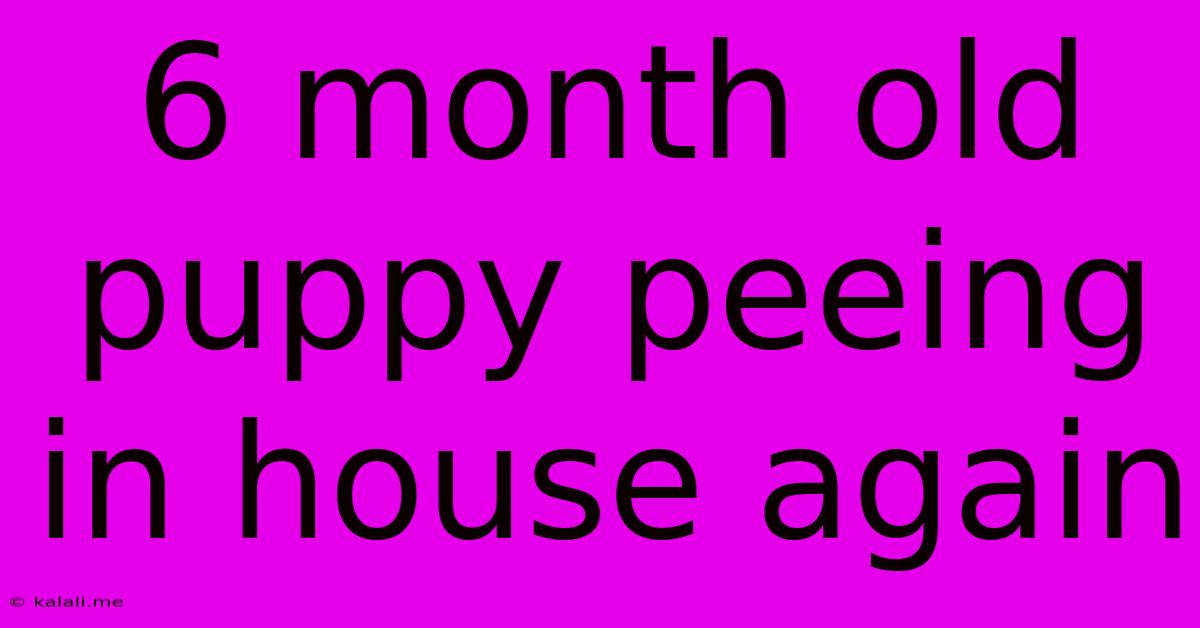6 Month Old Puppy Peeing In House Again
Kalali
May 22, 2025 · 3 min read

Table of Contents
6-Month-Old Puppy Peeing in the House Again: Troubleshooting Regression
Meta Description: Is your 6-month-old puppy suddenly peeing in the house after months of progress? Don't worry, it's more common than you think! This guide explores the reasons behind this regression and offers solutions to help you regain house training success.
House training a puppy is a marathon, not a sprint. While many puppies show significant progress by six months, experiencing setbacks—like your previously reliably house-trained pup suddenly peeing inside again—is frustrating but unfortunately common. Before you despair, understand that several factors can contribute to this regression, and with a systematic approach, you can regain control and reinforce good potty habits.
Common Reasons for House Training Regression in 6-Month-Old Puppies
Several reasons could explain why your previously well-trained puppy is suddenly having accidents indoors. Let's explore some of the most frequent culprits:
-
Medical Issues: A sudden change in urination habits can signal a urinary tract infection (UTI), kidney problems, or even diabetes. A visit to the vet is crucial to rule out any underlying medical conditions. Changes in urine frequency, straining to urinate, or blood in the urine are all warning signs requiring immediate veterinary attention.
-
Stress and Anxiety: Puppies are sensitive creatures. Changes in their environment – a new family member, moving houses, a change in routine, loud noises, or even a change in your schedule – can trigger anxiety, leading to accidents. Even seemingly minor disruptions can affect their bladder control.
-
Inconsistent Training: Even the most dedicated owners can slip up occasionally. Inconsistent reinforcement of potty training protocols (irregular feeding schedules, inconsistent potty breaks, or inconsistent praise and correction) can confuse your puppy and lead to accidents.
-
Excitement or Submissive Urination: Some puppies urinate out of excitement when greeted enthusiastically or when faced with stressful situations. Submissive urination, often seen as a sign of fear or nervousness, can also contribute to accidents.
-
Marking Behavior: As puppies mature, particularly males, they may start marking territory. This is different from eliminating waste and often involves small amounts of urine in various locations.
-
Insufficient Potty Breaks: Six-month-old puppies still have relatively small bladders. If their potty breaks are too infrequent, they might simply not be able to hold it. Consider increasing the frequency, especially after naps, meals, and playtime.
Solutions and Strategies
Addressing the regression requires a multi-pronged approach:
-
Veterinary Check-up: This is the first and most important step. Rule out any medical conditions that might be contributing to the problem.
-
Environmental Enrichment: Reduce stress by providing a safe and predictable environment. A consistent routine, a comfortable den (like a crate or dog bed), and opportunities for safe, supervised play are crucial.
-
Consistent Training Reinforcement: Return to the basics of house training. Frequent, supervised potty breaks (every 1-2 hours), positive reinforcement (treats and praise for successful potty breaks), and immediate, calm correction for accidents (never punish) are essential. Use a consistent command (such as "Go potty") during these breaks.
-
Management: Confine your puppy to a smaller, easily cleanable area when unsupervised. Crate training can be exceptionally helpful, providing a safe space and preventing accidents.
-
Identifying Triggers: Observe your puppy carefully to identify any patterns or triggers leading to accidents. This may help you prevent them by altering the environment or routine.
-
Professional Help: If the problem persists despite your efforts, consider consulting a certified professional dog trainer or veterinary behaviorist. They can offer tailored guidance and address underlying behavioral issues.
Regaining house training success with your six-month-old puppy requires patience, consistency, and a willingness to address any underlying medical or behavioral issues. By carefully considering the potential causes and implementing the appropriate strategies, you can successfully navigate this setback and enjoy a happy, house-trained companion.
Latest Posts
Latest Posts
-
How To Use Sout In Latex
May 22, 2025
-
What Another Ay To Say Something Has Been Unoptimized
May 22, 2025
-
Axl Rose Owns Guns And Roses
May 22, 2025
-
How To Remove Mold From Wood
May 22, 2025
-
How To Say Hi In Japanese
May 22, 2025
Related Post
Thank you for visiting our website which covers about 6 Month Old Puppy Peeing In House Again . We hope the information provided has been useful to you. Feel free to contact us if you have any questions or need further assistance. See you next time and don't miss to bookmark.